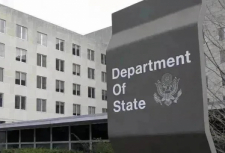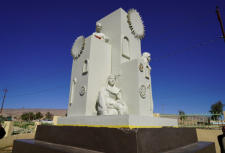Report of the Office of the United Nations High Commissioner for Human Rights on Georgia

(Summary of contributions)
The present report has been prepared in accordance with Human Rights Council resolutions 5/1 and 16/21, taking into consideration the periodicity of the universal periodic review. It is a summary of 30 stakeholders' submissions to the universal periodic review and is presented in a concise manner due to word limit. A separate section is devoted to information received from the national human rights institution accredited in full compliance with the Paris Principles.
A representative of the Office of the Public Defender of Georgia stated that the State was hardly taking any adequate measures to address the stereotypes and misconceptions about vulnerable groups that were the cause of discrimination. The situation in terms of equality of religious and ethnic minorities is critical.
The report noted that racism and anti-migrant and populist attitudes had become serious problems in Georgia. It speaks about the growth of aggression, violence and xenophobia, especially against citizens of African and Asian countries. It noted that neo-fascist and far-right groups attacked people in public places and held rallies with slogans intimidating foreigners.
The Advisory Committee on the Framework Convention for the Protection of National Minorities (ACFC) called on the authorities to continue their efforts to effectively combat hate crimes by systematically and promptly investigating all crimes committed with a discriminatory motive. It also called on the authorities to increase efforts to more effectively prosecute and punish such crimes.
The authors recommended that the State continue to train police, prosecutors and judges in dealing with hate crimes, as well as conduct campaigns to raise awareness among young people about the consequences of hate-motivated violence.
The Advisory Committee on the Framework Convention for the Protection of National Minorities called on the authorities to systematically and promptly condemn all instances of intolerance, particularly in public discourse.34
It recommended that the State urgently establish a hate crimes unit within the law enforcement system to strengthen the investigation, prosecution and prevention of hate crimes based on sexual orientation and gender identity.
ADF International recommended that the State promote intercultural and interreligious dialogue and cooperation.
The report notes that it is recommended that the State provide ethnic minority children with educational resources and quality textbooks and improve the quality of teaching of the State language.
It notes that the participation of ethnic minorities in political, social and cultural life remains a problem. The prevailing political and cultural agenda prevents them from enjoying their rights, including the right to use their language when communicating with public authorities, the right to freedom of their culture and the right to effective participation in decision-making processes.
The Advisory Committee has called on the state to effectively consult representatives of national minorities before developing and launching important infrastructure projects that may affect them.
It is said that minorities' access to information is hindered by the digital divide in rural localities and small towns where minorities live. Lack of access to information in a language understood by the minority became crucial during the COVID-19 pandemic.
The Advisory Committee called upon the authorities, alongside the promotion of the use of the State language, to effectively guarantee the right to use minority languages orally and in writing for persons belonging to national minorities in their relations with administrative or judicial authorities, in areas traditionally inhabited by such persons or where they live in significant numbers. It also called on the authorities to provide for the translation of relevant legislation into minority languages.
It was recommended that the State should take positive steps to promote employment of ethnic minorities in central and local government, with particular attention to graduates of the "1 + 4" university programme.
It was recommended that the State conduct a comprehensive study of gaps in minority education, including gaps in state language instruction and root causes of unequal conditions.
It was recommended that the state compile a list of ethnic minority cultural and heritage sites and take specific measures to protect and promote them.
If necessary, the reader can read the full report in English and Russian at the link to the documents.
Tags: #yazidisinfo #newsyazidis #reportofgeorgia
Report of the Office of the United Nations High Commissioner for Human Rights on Georgia

(Summary of contributions)
The present report has been prepared in accordance with Human Rights Council resolutions 5/1 and 16/21, taking into consideration the periodicity of the universal periodic review. It is a summary of 30 stakeholders' submissions to the universal periodic review and is presented in a concise manner due to word limit. A separate section is devoted to information received from the national human rights institution accredited in full compliance with the Paris Principles.
A representative of the Office of the Public Defender of Georgia stated that the State was hardly taking any adequate measures to address the stereotypes and misconceptions about vulnerable groups that were the cause of discrimination. The situation in terms of equality of religious and ethnic minorities is critical.
The report noted that racism and anti-migrant and populist attitudes had become serious problems in Georgia. It speaks about the growth of aggression, violence and xenophobia, especially against citizens of African and Asian countries. It noted that neo-fascist and far-right groups attacked people in public places and held rallies with slogans intimidating foreigners.
The Advisory Committee on the Framework Convention for the Protection of National Minorities (ACFC) called on the authorities to continue their efforts to effectively combat hate crimes by systematically and promptly investigating all crimes committed with a discriminatory motive. It also called on the authorities to increase efforts to more effectively prosecute and punish such crimes.
The authors recommended that the State continue to train police, prosecutors and judges in dealing with hate crimes, as well as conduct campaigns to raise awareness among young people about the consequences of hate-motivated violence.
The Advisory Committee on the Framework Convention for the Protection of National Minorities called on the authorities to systematically and promptly condemn all instances of intolerance, particularly in public discourse.34
It recommended that the State urgently establish a hate crimes unit within the law enforcement system to strengthen the investigation, prosecution and prevention of hate crimes based on sexual orientation and gender identity.
ADF International recommended that the State promote intercultural and interreligious dialogue and cooperation.
The report notes that it is recommended that the State provide ethnic minority children with educational resources and quality textbooks and improve the quality of teaching of the State language.
It notes that the participation of ethnic minorities in political, social and cultural life remains a problem. The prevailing political and cultural agenda prevents them from enjoying their rights, including the right to use their language when communicating with public authorities, the right to freedom of their culture and the right to effective participation in decision-making processes.
The Advisory Committee has called on the state to effectively consult representatives of national minorities before developing and launching important infrastructure projects that may affect them.
It is said that minorities' access to information is hindered by the digital divide in rural localities and small towns where minorities live. Lack of access to information in a language understood by the minority became crucial during the COVID-19 pandemic.
The Advisory Committee called upon the authorities, alongside the promotion of the use of the State language, to effectively guarantee the right to use minority languages orally and in writing for persons belonging to national minorities in their relations with administrative or judicial authorities, in areas traditionally inhabited by such persons or where they live in significant numbers. It also called on the authorities to provide for the translation of relevant legislation into minority languages.
It was recommended that the State should take positive steps to promote employment of ethnic minorities in central and local government, with particular attention to graduates of the "1 + 4" university programme.
It was recommended that the State conduct a comprehensive study of gaps in minority education, including gaps in state language instruction and root causes of unequal conditions.
It was recommended that the state compile a list of ethnic minority cultural and heritage sites and take specific measures to protect and promote them.
If necessary, the reader can read the full report in English and Russian at the link to the documents.
Tags: #yazidisinfo #newsyazidis #reportofgeorgia


























